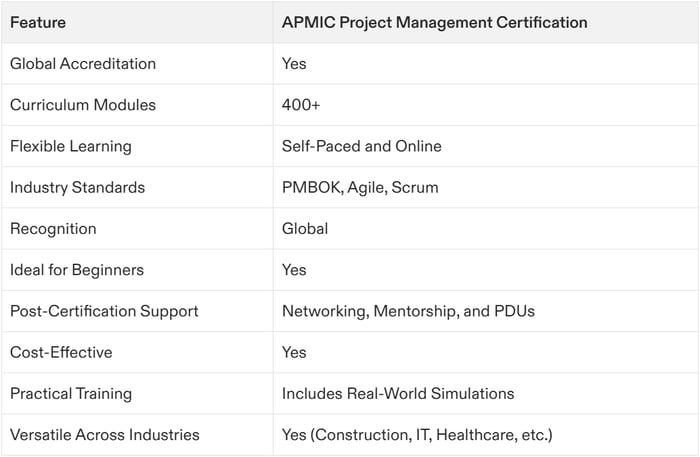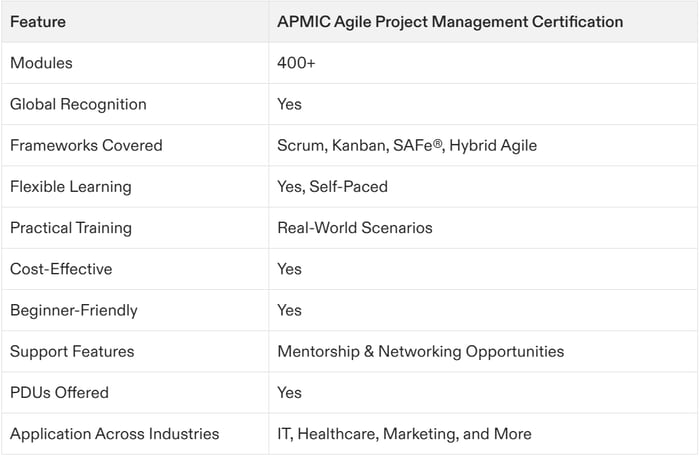Alright, buckle up buttercups! Ever feel like herding cats while navigating a minefield… in a hospital? Yeah, healthcare project management can be THAT wild. But fear not, aspiring project gurus! This is your ultimate guide to snagging that Healthcare Project Management Certification and becoming the maestro of medical mayhem (in a good way, of course!).
Healthcare Project Management Certification: Your 2025 Masterclass
The healthcare industry. It's a realm of constant evolution, where innovation dances with regulation, and patient well-being reigns supreme. As we navigate the complexities of 2025, the demand for skilled project managers in healthcare has never been higher. These aren't your run-of-the-mill PMs; they're strategic orchestrators, adept at navigating the unique challenges of this critical sector. If you're looking to enhance your expertise, accelerate your career, and contribute to systems that directly impact patient care and operational efficiency, then obtaining a Healthcare Project Management Certification is one of the most strategic investments you can make.
Whether you're coordinating the intricate dance of hospital IT systems, spearheading crucial public health initiatives, or managing responses to unforeseen crises like pandemics, a specialized certification arms you with the essential tools and strategies to tackle projects in this high-stakes field. This isn’t just about managing tasks; it’s about leading with purpose, understanding the nuances of healthcare, and driving projects that improve lives. This comprehensive guide will cover everything you need to know about Healthcare Project Management Certification – from its profound benefits and top certification options to actionable strategies for accelerating your career.
If you're considering an online certification, exploring Google’s Free Project Management Certification is a great place to start. It provides foundational knowledge and can be a stepping stone to more advanced credentials.
Globally recognized programs, such as the APMIC certification, are renowned for their comprehensive approach. Featuring an extensive curriculum with over 400 specialized modules, these programs offer in-depth skills development for tackling advanced healthcare project management challenges. Think of it as earning your black belt in healthcare project leadership!
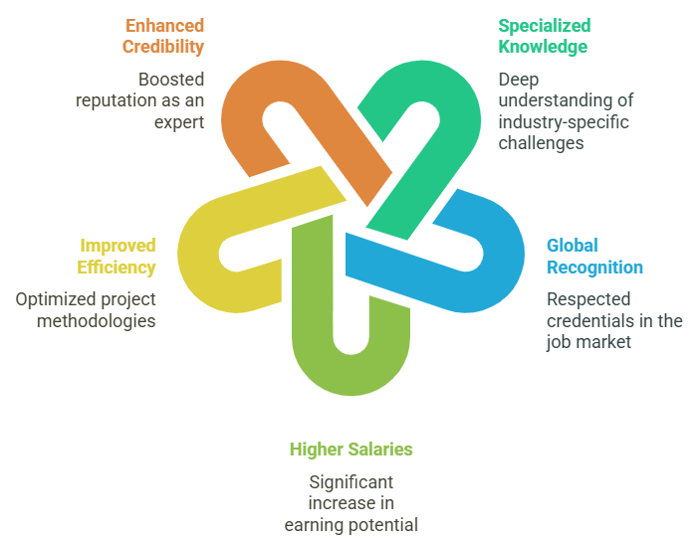
Why You Absolutely Need a Healthcare Project Management Certification in 2025
Let’s face it: healthcare projects are not for the faint of heart. They’re often characterized by high-pressure scenarios, stringent regulatory requirements (think HIPAA, GDPR, and more!), and multidisciplinary teams that span medical, administrative, and technical fields. To thrive in this demanding environment, professionals need more than just generic project management skills. Certifications ensure you gain the specialized knowledge, organizational prowess, and leadership capabilities required to deliver successful projects that truly make a difference.
Top Advantages of Certification
Specialized Knowledge: A healthcare-focused certification plunges you deep into industry-specific challenges, including regulatory compliance, intricate risk management protocols, and the development of patient-focused solutions that prioritize well-being and accessibility. It's like having a secret decoder ring for navigating the healthcare landscape.
Global Recognition: Credentials like the Project Management Professional (PMP) and APMIC certification aren't just pieces of paper; they're globally respected badges of honor. They instantly set you apart in a competitive job market, signaling to employers that you possess a validated skillset and a commitment to excellence.
Higher Salaries: Let's talk money. Certified healthcare project managers consistently earn significantly more than their non-certified counterparts. Studies show that average pay increases by a substantial 20–40% upon certification. That's a serious ROI!
Improved Efficiency: In today's fast-paced world, efficiency is everything. Certifications equip you with proven methodologies like Agile, Scrum, and Lean, enabling you to optimize project timelines, streamline workflows, and achieve exceptional outcomes. It's about working smarter, not harder.
Enhanced Credibility: Certification instantly boosts your credibility within your organization and the wider healthcare community. You'll be viewed as a subject matter expert, a go-to resource for project-related challenges, and a valuable asset to any team.
Mastering the Skills: What You'll Learn
Healthcare project management certifications are designed to build expertise in critical areas that are essential for success in the field. Here's a glimpse into the skills you'll master:
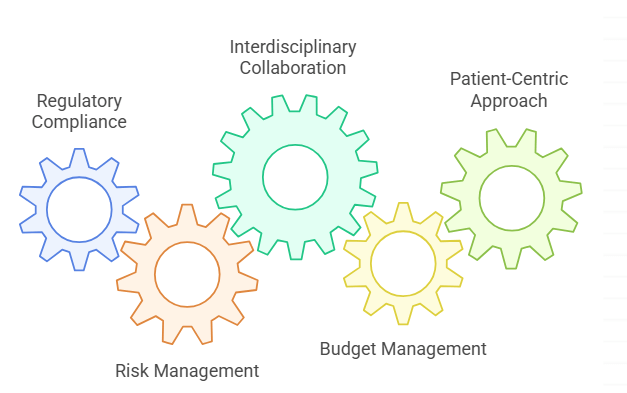
Regulatory Compliance: Healthcare projects operate within a labyrinth of regulations, from HIPAA and GDPR to industry-specific guidelines. You’ll learn how to implement processes that are fully compliant with these standards, ensuring patient privacy, data security, and ethical conduct.
Risk Management: Identifying, assessing, and mitigating potential risks is paramount in healthcare. You'll learn how to proactively identify potential pitfalls, assess their potential impact, and deploy effective strategies for mitigation, minimizing disruptions and safeguarding project success.
Interdisciplinary Collaboration: Healthcare projects require seamless communication and collaboration between stakeholders from diverse backgrounds – medical professionals, administrative staff, technical experts, and more. You'll master the tools and techniques for fostering effective communication, resolving conflicts, and building cohesive, high-performing teams.
Budget and Resource Management: Optimizing resources and timelines is critical for cost-effective project execution. You’ll learn how to develop realistic budgets, allocate resources efficiently, and manage timelines effectively, ensuring projects stay on track and within budget.
Patient-Centric Approach: Ultimately, healthcare projects are about improving patient outcomes and enhancing healthcare access. You'll learn how to ensure that project deliverables are aligned with these goals, leading to better patient experiences, improved quality of care, and increased accessibility for all.
Certifications like the APMIC certification stand out for their rich, hands-on curriculum tailored specifically for healthcare professionals aiming to lead complex, high-impact initiatives. It's about gaining practical skills that you can immediately apply to real-world projects.
The Top Healthcare Project Management Certifications in 2025
Alright, let's dive into the top certification options that will elevate your healthcare project management game in 2025:
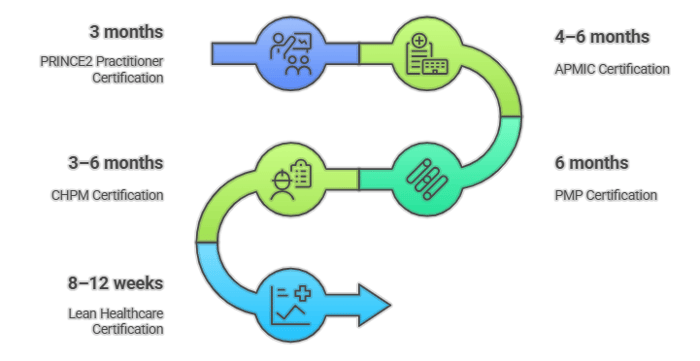
APMIC Certification
The APMIC (Accredited Project Management International Certification) certification is the gold standard for healthcare project management professionals. With its comprehensive curriculum encompassing over 400 modules, APMIC provides unmatched depth and breadth, covering healthcare-specific topics such as:
Clinical trial management
Public health initiative planning
Hospital IT systems implementation
Healthcare data analytics
Medical device development
Ideal For: Professionals seeking leadership roles in healthcare project management, senior project managers, program managers, and directors.
Duration: Flexible, typically 4–6 months, allowing you to learn at your own pace.
Key Benefits:
Advanced focus on Agile leadership principles tailored for healthcare environments.
In-depth understanding of regulatory frameworks and compliance requirements.
Mastery of risk management strategies specific to healthcare projects.
Globally recognized credential that opens doors to leadership opportunities.
PMP (Project Management Professional)
The PMP certification, offered by the Project Management Institute (PMI), is a globally renowned and highly respected credential that demonstrates your competence in leading and directing projects. While not exclusively healthcare-focused, the PMP is versatile and includes healthcare case studies to help professionals adapt its methods to the industry.
Ideal For: Project managers seeking global credentials to broaden their impact, mid-career professionals looking to advance their careers, and individuals seeking a versatile certification applicable across industries.
Duration: Typically 6 months, involving comprehensive study and exam preparation.
Key Benefits:
Globally recognized credential that enhances your credibility and marketability.
Demonstrates your understanding of project management principles and best practices.
Applicable across various industries, providing versatility and career flexibility.
Access to a vast network of PMP-certified professionals worldwide.
Certified Healthcare Project Manager (CHPM)
The CHPM certification is specifically designed for healthcare project managers, focusing on the unique challenges and requirements of the industry. It's an excellent option for those seeking a specialized certification tailored to healthcare.
Ideal For: Entry-level to mid-career healthcare project managers, individuals seeking a specialized certification, and professionals looking to enhance their knowledge of healthcare-specific project management principles.
Duration: Typically 3–6 months, involving focused study and exam preparation.
Key Benefits:
Specialized knowledge of healthcare regulations, compliance requirements, and industry best practices.
Enhanced ability to manage hospital operations and healthcare services efficiently.
Improved understanding of patient-centered project management approaches.
Increased career opportunities in the healthcare sector.
PRINCE2 Practitioner
PRINCE2 (Projects IN Controlled Environments) is a structured project management methodology that is widely used in the UK and Europe. While not healthcare-specific, PRINCE2 Practitioner is popular in large healthcare organizations for managing risks and resources effectively.
Ideal For: Healthcare managers in the UK and Europe, individuals working in organizations that utilize PRINCE2 methodology, and professionals seeking a structured approach to project management.
Duration: Typically 3 months, involving focused training and exam preparation.
Key Benefits:
Structured methodology for managing projects effectively.
Improved risk management and resource allocation capabilities.
Enhanced communication and collaboration within project teams.
Recognition as a skilled project manager within PRINCE2-driven organizations.
Lean Healthcare Certification
Lean principles focus on improving operational workflows and reducing waste. A Lean Healthcare Certification is excellent for professionals looking to optimize processes and enhance efficiency in healthcare facilities.
Ideal For: Operations-minded project managers, individuals seeking to improve healthcare workflows, and professionals interested in applying Lean principles to healthcare settings.
Duration: Typically 8–12 weeks, involving training and practical application of Lean principles.
Key Benefits:
Improved understanding of Lean principles and their application in healthcare.
Enhanced ability to identify and eliminate waste in healthcare processes.
Increased efficiency and productivity in healthcare operations.
Improved patient satisfaction through streamlined workflows.
How to Choose the Right Certification for You
With so many fantastic options available, selecting the best Healthcare Project Management Certification can feel overwhelming. Don't worry! It’s essential to consider multiple factors that align with your unique goals, current career stage, and personal preferences. Here's an extended guide to help you make the best choice for your professional advancement:
Assess Your Experience Level
Your current experience in project management and/or the healthcare sector will heavily influence your optimal choice of certification.
For Beginners: If you're new to the world of project management, starting with an entry-level certification like the Certified Healthcare Project Manager (CHPM) or CompTIA Project+ is a smart move. These programs focus on the fundamental building blocks of project planning, teamwork dynamics, and effective communication strategies.
For Mid-Career Professionals: If you already have a solid track record of managing healthcare projects, certifications like the PMP or PRINCE2 Practitioner can elevate your credentials to the next level. They offer advanced techniques for managing teams, budgets, and risks, providing you with the skills to tackle more complex projects.
For Senior or Executive-Level Professionals: For those already in leadership roles or aspiring to oversee enterprise-level, high-stakes projects, an advanced certification like the APMIC certification is ideal. With its 400+ modules, it delivers in-depth, globally recognized training in managing large-scale and multifaceted healthcare operations effectively.
If you prefer an online and flexible learning path, consider taking a structured program like the Coursera Project Management Certification, which offers comprehensive training for professionals at all levels.
Define Your Career Goals (The Big Picture!)
Your certification choice should be a direct reflection of where you envision yourself in the next 3–5 years. What are your ultimate career aspirations?
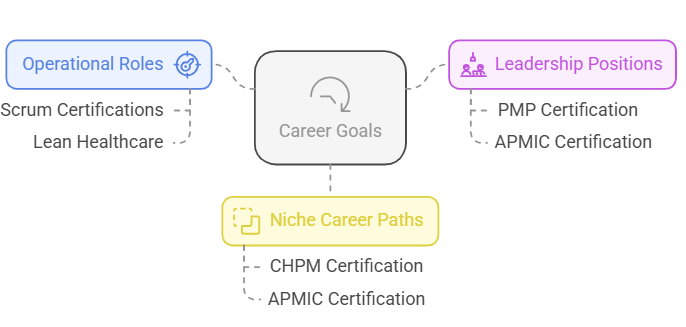
Goal 1: Operational Roles: If you're laser-focused on operational roles within healthcare, certifications that emphasize tools like Scrum and Lean (e.g., Lean Healthcare) will equip you with the skills to optimize processes, eliminate inefficiencies, and drive measurable improvements in patient care.
Goal 2: Leadership Positions: Do you have your sights set on leadership positions within global healthcare organizations? If so, comprehensive certifications such as the PMP or APMIC are designed to develop your ability to lead large, diverse teams and align projects with overarching organizational strategies.
Goal 3: Niche Career Paths: Perhaps you have a specific niche in mind, such as IT health systems implementation or clinical trial management. In these cases, certifications tailored for these specialized areas (like CHPM and APMIC) will provide you with the focused knowledge and skills you need to excel.
By meticulously choosing a certification that maps directly to your goals, you'll achieve a quicker return on investment and find yourself on a clear, accelerated path to success.
Consider Healthcare-Specific Needs: It's a Unique World!
Healthcare project management presents a unique set of challenges, including strict regulatory compliance, unwavering patient safety protocols, and the need for seamless interdisciplinary coordination. Certifications specifically designed for this sector can provide you with a distinct competitive advantage.
CHPM and APMIC: These programs are intentionally focused on the healthcare industry, covering critical areas such as regulatory compliance (HIPAA, GDPR), complex risk management, and achieving patient-centered results.
PMP and PRINCE2: While not exclusively healthcare-related, these certifications offer transferable project management skills that are applicable across a wide range of industries, making them a versatile choice.
If healthcare is your primary focus, select a certification that addresses the specific demands and intricacies of the industry.
Evaluate Budget and Time Commitment: Be Realistic!
Certifications vary considerably in terms of both cost and time commitment. It's crucial to strike a balance between your current financial situation, the amount of time you can realistically dedicate to studying, and your long-term career advancement plans.
Short, Affordable Certifications: Programs like CompTIA Project+ or Lean Healthcare Certification often cost between $400–$900 and take only a few weeks to complete, making them an ideal starting point for those on a tight budget or a constrained schedule.
Premium, Comprehensive Programs: Certifications like the PMP or APMIC certification range between $1,500–$2,500, offering in-depth curriculum and globally recognized credentials. While these require a greater upfront investment, the potential payoff in terms of job opportunities and salary increases is substantial.
Always factor in the potential return on investment (ROI). Certifications with global recognition and advanced training typically lead to faster career growth and higher salary prospects.
Explore Industry Trends: Stay Ahead of the Curve!
Staying up-to-date with the latest industry trends can help you choose a certification that's not only in demand now but also likely to remain relevant in the years to come.
Demand for Agile and Lean Methodologies: Many healthcare organizations are embracing Agile methodologies and Lean principles to manage project workflows more efficiently. Certifications like APMIC, PMP, and Lean Healthcare address these trends directly.
Digital Transformation in Healthcare: The healthcare industry is undergoing a rapid digital transformation, with increased reliance on IT systems and digital tools. Certifications that include modules on IT systems and digital tools, such as APMIC and PMP, will prove particularly advantageous.
10 Less Commonly Known Facts About Healthcare Project Management (with Sources!)
Want to impress your colleagues with your deep knowledge? Here are some fascinating facts about healthcare project management you might not know:
The First Hospital Project Managers Were Often Nurses: Before project management became a formal discipline in healthcare, experienced nurses often took on the role of coordinating and managing projects due to their deep understanding of clinical workflows. (Reference)
Healthcare Projects Have a Higher Stakeholder Complexity: Due to the involvement of diverse stakeholders like doctors, patients, insurance companies, and regulatory bodies, healthcare projects often have a higher degree of stakeholder complexity compared to other industries. (Reference)
Telemedicine Implementation Requires Unique Project Management Skills: Successfully implementing telemedicine programs requires project managers to understand not only technology but also the nuances of remote patient care and data security. (Reference)
"Meaningful Use" Incentives Drove a Surge in Healthcare IT Projects: The U.S. government's "Meaningful Use" program, which provided financial incentives for adopting electronic health records (EHRs), led to a significant increase in healthcare IT projects and the demand for skilled project managers. (Reference)
Data Analytics Projects Are Transforming Healthcare Delivery: Project managers are increasingly involved in data analytics projects that aim to improve patient outcomes, reduce costs, and optimize healthcare delivery through insights derived from vast datasets.
Virtual Reality Is Entering Healthcare Project Management: Virtual reality (VR) is now used to simulate project environments, train project teams, and visualize project outcomes, offering innovative ways to improve project planning and execution.
Healthcare Supply Chain Projects Require Specialized Expertise: Managing healthcare supply chains effectively requires project managers to understand the complexities of inventory management, regulatory compliance, and the unique demands of medical supplies and equipment.
The Use of AI in Healthcare Projects Is Growing Rapidly: AI is being integrated into various healthcare projects, from diagnostic tools to patient monitoring systems, requiring project managers to have a basic understanding of AI concepts and ethical considerations. (Reference)
HIPAA Compliance Can Significantly Impact Project Timelines: Ensuring HIPAA compliance in healthcare projects can add considerable time and complexity to project timelines, requiring meticulous planning and attention to detail.
Patient Engagement Strategies Are Critical for Project Success: Successfully engaging patients in healthcare projects, such as designing new care models or developing patient portals, is essential for ensuring that projects meet their needs and improve their experiences.
Certification Comparison Table for Healthcare Project Management
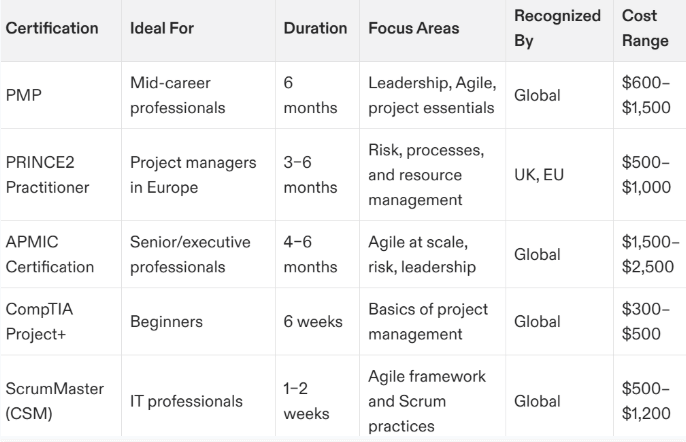
Final Thoughts: Your Journey Starts Now!
A Healthcare Project Management Certification is more than just a credential; it's your ticket to thriving in this rapidly growing and vitally important field. Whether you're driven to enhance operational efficiency, expertly manage multidisciplinary teams, or lead impactful global health initiatives, the right certification will sharpen your skills, expand your knowledge, and unlock significant career opportunities you never thought possible.
Programs like the APMIC certification, renowned for their comprehensive curriculum with over 400+ modules, provide advanced training meticulously tailored to address real-world challenges in the ever-evolving healthcare landscape. By carefully choosing a certification that aligns perfectly with your unique career aspirations, you'll ensure that you're not just prepared, but poised to excel in healthcare project management and make a truly meaningful impact on the lives of patients and the future of healthcare.
Ready to take the next step and transform healthcare projects for a better future? Then head over to AMPIC and discover how our industry-leading PMP Certification Prep Course can equip you with the knowledge, skills, and confidence you need to achieve your certification goals and unlock your full potential. Your journey to becoming a healthcare project management superstar starts today!
FAQs
What Exactly is a Healthcare Project Management Certification?
A Healthcare Project Management Certification is a professional credential designed to validate your competence in managing healthcare-related projects effectively. Programs like the PMP and APMIC certification equip managers with the specialized skills to lead projects focused on patient safety, regulatory compliance, and operational efficiency. It's proof that you know your stuff!
Who Should Get a Healthcare Project Management Certification? Is it Right for Me?
These certifications are an excellent fit for a wide range of professionals, including healthcare administrators, IT project managers working in health services, and anyone involved in managing healthcare projects who seeks formal recognition of their expertise. If you're passionate about improving healthcare and leading successful projects, then this is definitely for you.
How Long Does it Actually Take to Complete a Certification?
The duration varies depending on the certification you choose. While CHPM can be completed in as little as 3 months, more advanced certifications like the APMIC certification typically require 4–6 months of flexible, part-time study. The key is to find a program that fits your learning style and schedule.
Will a Healthcare Certification Really Improve My Job Prospects?
Absolutely! Professionals with certifications are highly sought after and considered more job-ready by employers. They tend to land roles in hospitals, pharmaceutical companies, and government organizations at significantly higher salaries. A certification is an investment in your future.
Can I Earn This Certification While Working Full-Time? I Have a Life!
Yes, you can! Many certifications, including the PMP and APMIC, are designed with working professionals in mind. They offer flexible schedules, online learning options, and self-paced study materials, allowing you to balance your career and your education.




